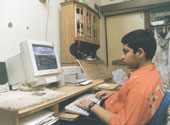 |
Many of you have taken a broadband connection and have been very enthusiastic about it. Till you woke up to the reality of your growing child with less than child like habits when online. Everybody knows the Internet is the largest repository of porn, a billion dollar business that does not care less whether its customers are over or under 18 years of age. And no, despite all those disclaimers and loud warnings to delinquents to stay away from adult sites, you know as well as those who write those warnings do that you really cannot keep anybody away because the Internet is a freeway. So how do you protect your child?
The BSNL portal 192.168.11 says, “manage Parental Account”. However, it is not for a single Dataone user. It is applicable only for those who run 10 to 20 Dataone accounts from one place. It is just a utility to manage all accounts from a single place/connection. It has nothing to do with blocking naughty sites from your children. So what can you do to manage the situation. You really should be worried for though most adults surf pornographic sites, few realise that traces of their visits always remain on the computer which a net savvy adolescent will fish out easily. Moms and dads, you all have a serious problem at home. The sooner you solve it the better it is.
A lot of adults get junk mails because they inadvertantly visited adult sites. These sites install a dialler and then you keep recieving explicit mails your child may well chance upon.
However, there are a lot of tools on the Internet to take care of these problems. For some of these, you must spend some money and there are others that are free, but might not be as effective.
 |
Effective tools
Let us start with the ubiquitous Internet Explorer. It has a parental control tool which unfortunately some times blocks out legitimate sites. However, to enable this go to Tools-Internet-Options. Click on the Content tab. On Content Adviser click Enable. You will see ‘Language, Nudity, Sex and Violence’. Select one and drag the slider to expose how much a person can see. Suppose you click on Nudity and drag the slider to the end the person will be able to see ‘provocative frontal nudity’. If you do not want your child to view nudity or violence of any kind leave the slider at zero. Go through each of the criteria and make your settings.
Next click on the tab for Approved sites. Here you can add what you find desirable. Then click on the General tab and put a Supervisor password so that no one an override your settings. There are Rating Systems on the Internet too. You could buy one of these and this will take care of your problems of explicit sex and violence. Once you have done this you will be quite safe. But, I stress, the drawback is that a perfectly valid site is often blocked by the Content Advisor.
That is why it is always better to buy a software, much like an antivirus software that keeps track of sex sites and gives weekly updates of the definition files. This is very much like updating your antivirus software. One of the better ones is the $40 Cybersitter (www.cybersitter.com). It has been a five time winner of the PC Magazine Award. Its credentials are really good. You can check who your children are chatting with, or what sites they are browsing. It will even send an email to you if they are being really naughty. And all this happens without them having a clue of what you have set up to spy on them. After the $40 there is no extra charge. The current version is 9.
Another one is called Cyberpatrol. This too is priced at $ 40 and is available from www.cyberpatrol. com. Go to the site and click on Products. The current version is 7.6.
 |
Educate your child
But the best way is to educate you children before you introduce them to the Internet. Impress upon them that they should
• Never mix with strangers
• Never give out passwords
• Never give our addresses
• Never have a face to face meeting with some one they met on the internet
• Never respond to provoking messages online
However, we all know that too many ‘never’s often provoke children to do exactly what they are told never to do. So you could take some simple steps to make vigilance easier. Place your home computer in a living room or a family room. Make Internet exploration a family activity
Pay attention to the games your children play. Some are of full of gore and are detrimental to the child’s development
Now here are some frightening facts. Which is why you must educate your child before Internet use.
• One out of four children has sent a picture of people having sex
• One out of five children has been sexually solicited online
• Two years ago, a child was killed by a predator he met on the Internet.
 |
Tips for parents
• Tell your boy or girl never to reveal his or her name
• Communicate regularly about what they do online
• I have mentioned this earlier, but make sure you put your child’s computer in a family room
• Choose your child’s screen name carefully. They should never be explicit like ‘sexylegs’ or ‘siliconboobs’
• Next, get the software that I mentioned to you earlier. They really are some of the best.
Earlier topics in Bits & Bytes:










